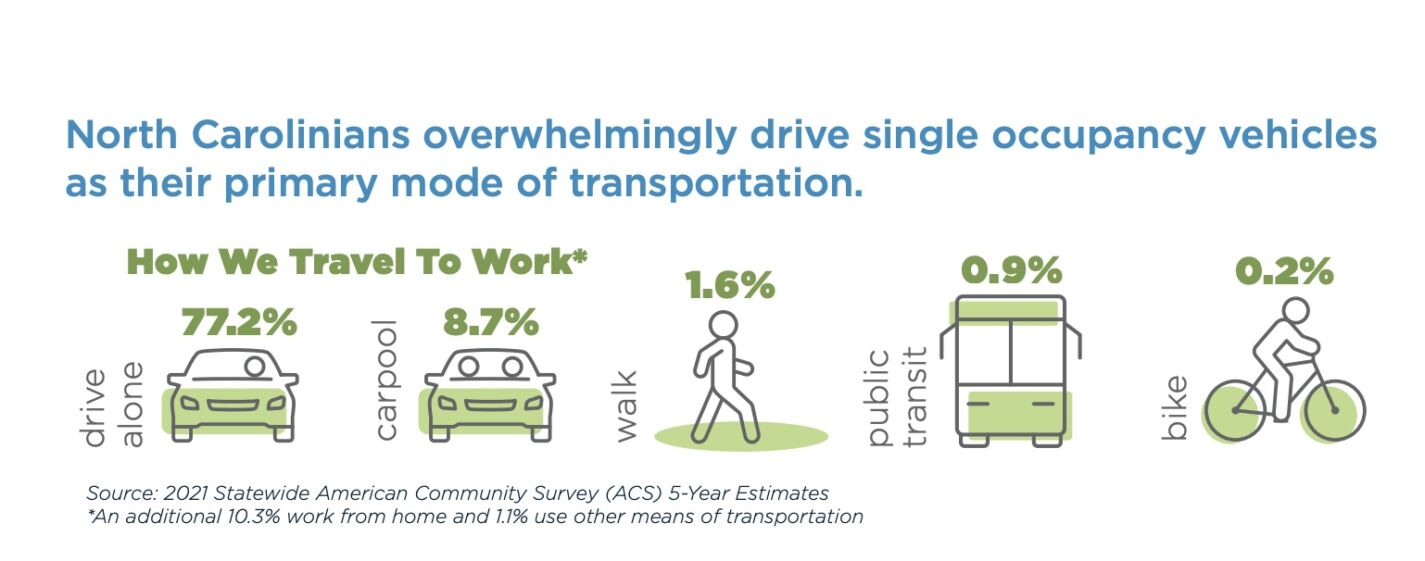The North Carolina Department of Transportation unveiled its Clean Transportation Plan Wednesday. They say it will reduce greenhouse gas emissions, advance “environmental justice,” and create good-paying jobs tied to clean transportation.
Democrat Gov. Roy Cooper imposed a series of executive orders that led to the plan’s creation. Executive Order 80 in 2018, which first addressed climate change and transitioning to a clean energy economy; Executive Order 246 in January 2022, entitled North Carolina’s Transformation To A Clean, Equitable Economy; and Executive Order 271 in October, focused on growing the state’s zero-emissions vehicle market.
“The NCDOT’s plan is an example of the sort of byzantine central planning that takes place when the government tries to force things people in a free market haven’t chosen,” said Jon Sanders, director of the Center for Food, Power, and Life and research editor at the John Locke Foundation. “A government team, a task force comprising different government agencies, meetings with associated special-interest groups and government-instituted monopolies, and government attempts to prioritize projects and set prices — this is like reading a 1980s economics textbook describing the terminal follies of Soviet top-down bureaucracy.”
NCDOT and over 220 stakeholders worked for more than a year to develop the draft plan, encouraging what they say is an equitable transition to cleaner transportation alternatives, such as zero- and low-emission vehicles, and offering strategies to deploy electric charging stations and other clean transportation infrastructure to support the transition.
The plan’s recommendations include creating a dedicated clean transportation team and an interagency task force, instituting policies and programs that promote access and affordability to clean transportation options, which will prioritize infrastructure investments for traditionally underserved communities.
The plan will also evaluate and update project prioritization programs and partner with electric utilities to promote clean energy and clean transportation options that will promote effective pricing.
NCDOT said, “the planning process created the opportunity to reflect on the impacts of past decisions, listen to the needs of traditionally underserved communities, and work to ensure that the externalities of the past are not carried forward into the future. In North Carolina (as with other states), transportation decisions have often negatively and disproportionately impacted traditionally underserved communities and have contributed to generational harms.”
The report cites that the main mode of transportation for North Carolinians is driving their own vehicle or carpooling (86%), followed by walking at 1.6%, public transit at 0.9%, and bicycling at 0.2%.
EO-271 mandates the increased sale of electric vehicles, especially in the larger vehicles used in the trucking industry, and requires the same by the state’s cabinet-level industries. A rule to impose the new mandate on private-vehicle manufacturers will be forthcoming by May.
Right after Cooper issued the order, Republican House Speaker Tim Moore, Cleveland, said in a tweet, “While we examine the details of Gov. Cooper’s executive action announced today, I can’t help but think that now is not the time for expansive, burdensome new mandates for our trucking industry while inflation and supply chain issues continue to crush NC families.”
“They (gasoline-powered vehicles) may not be Gov. Cooper’s choice, nor California Gov. Gavin Newsom’s choice,” Sanders said. “But this plan is part of Gov. Cooper’s “Memorandum of Understanding” with Newsom. The General Assembly should understand, if Cooper doesn’t, that Newsom has no authority to set policy in North Carolina.”
Sanders added that North Carolina law precludes state environmental agencies from imposing stricter, more expensive, and more disruptive environmental regulations than what the federal government already does.
“Since Cooper seeks to go around that law by having the NCDOT impose environmental regulations, the General Assembly should expand that law to cover all state agencies, not just environmental agencies,” he said.
NCDOT has scheduled six open house meetings, concluding on March 6, so people can learn about the plan and provide feedback.
People can also provide feedback on NCDOT’s website.
The public has until March 15 to provide feedback on the plan.
